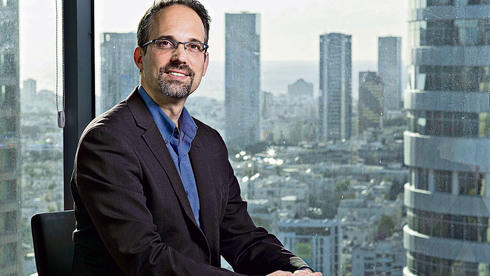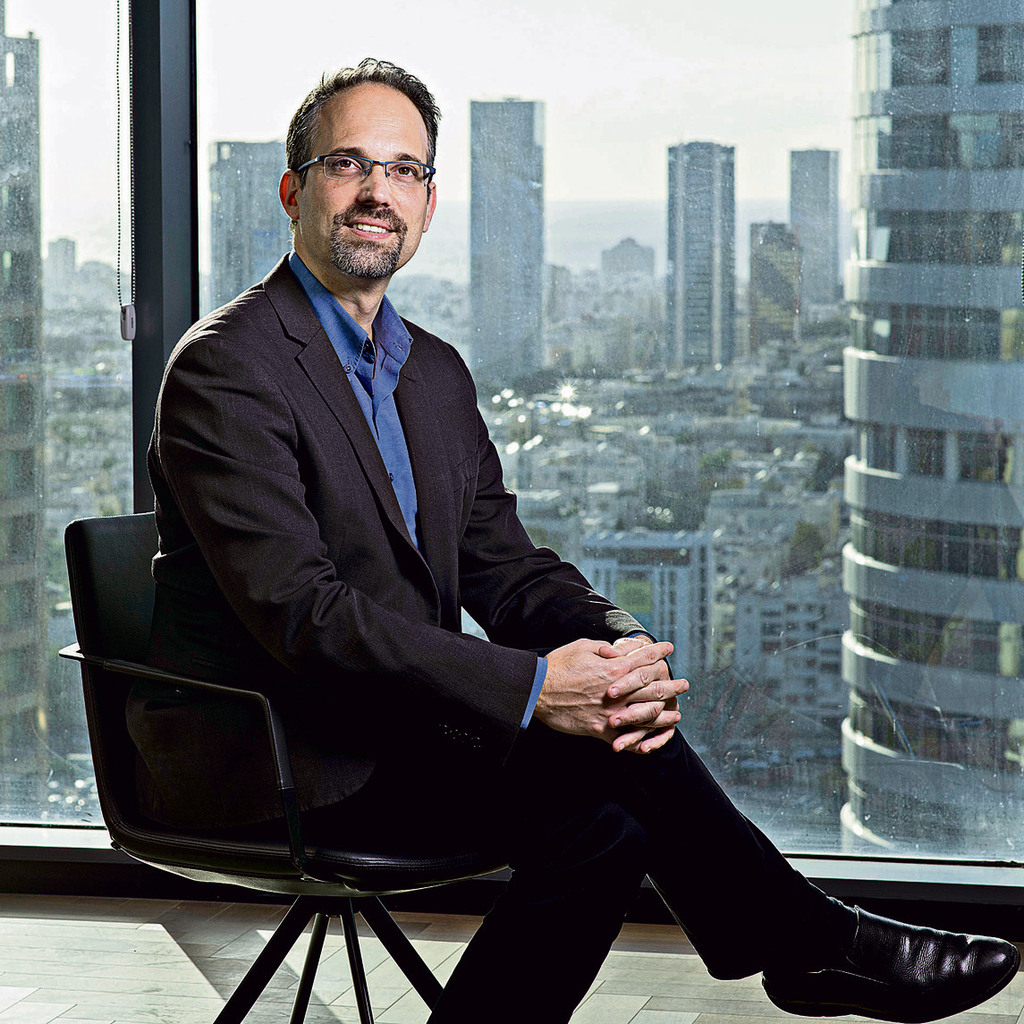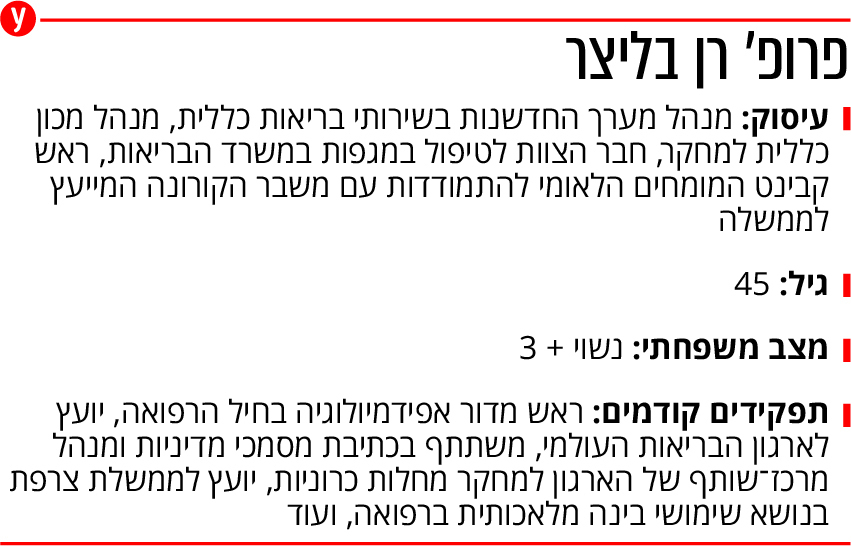
2 View the gallery


Prof. Ran Blitzer
(Photo: Yuval Chen)
Infinity cups of coffee, music while working, and especially the family – these are the tools that helped Prof. Ren Blitzer survive the days of the Corona. “It was a difficult time on a level I did not know,” he says. “With the need to make decisions with serious consequences, a high level of uncertainty, with missing information and under heavy pressure – hundreds of decisions over the period, hundreds of small and large questions, from the first, whether to close the sky, to whether to go to a third closure.” Blitzer did not meet the plague world for the first time this year. “My doctoral topic was ‘State Preparedness for Pandemic’ (epidemic), and for five years, between 2003 and 2008, I dealt with the readiness of the State of Israel and the health system for epidemics,” he says.
He began his medical studies at the age of 16 as part of an academic reserve, and in his military service as a physician he reached the position of head of the epidemiology section of the Medical Corps. At the age of 36 he was the youngest to be appointed professor of medicine. In addition, he holds a master’s degree in public health and a doctorate in health systems management, and is considered a world-renowned expert in medical innovation and digital health. He has published more than 200 studies, including the first major study to prove the effectiveness of Pfizer vaccines published recently.
He said when he was 36 he told himself that at 40 he would play a key role in the health system. This happened five years later, when the corona arrived and with it the work around the clock as the head of the cabinet of experts advising the government in dealing with the plague. This is while he continues his routine work in Clalit Health Services as director of the Innovation Division and as director of the Clalit Research Institute.
2 View the gallery


How do you survive under such pressure?
Blitzer: “This reflects the experience you have gained, the early thinking on the subject, and the peer groups with whom you can exchange views.”
And how are you released?
“Only now am I starting to get out of this year’s emergency. I had almost sleepless months. My wife was busy whole nights making me rounds of coffee, and eating here and there. For many months there was constant stress, and the adrenaline it creates in the body, with a sense of responsibility, Causes that you do not feel tired.You are involved in many decisions, along with different factors, everyone has their own advice and opinion, you do your best out of understanding that everyone wants to help, and there is no absolute truth.You try to make the right decision for that hour according to The knowledge you have, and constantly asking yourself whether you were right or not. In retrospect, there is a lot of satisfaction that the decisions were right.
“You also draw strength from working around the clock of so many people. The innovation team worked around the clock. I was able to do what I did because I am surrounded by talented people like demons and boundless devotees. And another encouraging factor is the fact that on such days you see years of preparation And practice, predictive models we have created, artificial intelligence and preventive medicine – have led to the fact that in real time, as early as March, we have created an unparalleled management model of patients with the greatest chance of deteriorating.When you look at the patient mortality rate, We created an artificial intelligence-based model that says who might be infected, and every time such a patient enters a clinic, an alert pops up on the computer screens that someone with high infection potential has just entered. the world”.
How to maintain clarity?
“First of all the family. That’s what kept me going. The support and lots of beautiful family moments, in methodical breaks that are produced with the family. Also quality time with the extended family. And all the time put daily life in the hold and say to myself and others: I am in reserve.”
When I ask Prof. Blitzer if there was any book that made him happy or inspired in the difficult days, a show or a movie on TV that he remembers, he laughs a big laugh. “I did not read a book for a long time, I do not have a TV at home, but I listened to a lot of music, while working, I like music of many styles. The only TV shows I watched were while many gifts in the studios for broadcasting. I also had to take time to explain in different communities , To sit with rabbis, with Rabbi Gershon Edelstein (Rosh Yeshivat Ponivez, one of the leaders of the Lithuanian public – NIS), with Rabbi Yitzchak Zilberstein.
A special moment for him was the moment when Rabbi Zilberstein – one of the greatest arbitrators in the Lithuanian sector, who is considered, among other things, an expert in halakhic jurisprudence in the field of medicine – announced that according to halakhah one should be vaccinated. “This was after a lively and lively discussion on the subject of vaccines, which lasted three hours. Many doctors participated in it, we were asked many questions, some of them not easy. In the end, the rabbi issued his ruling that the vaccine is effective and safe.” CNN with the Minister in charge of the vaccination campaign in the UK, Nadim Zahawi, I told about working with the ultra-Orthodox sector and the ruling of Rabbi Zilberstein and following the rest of the greats of the generation, then the British Minister said that from that moment there was a change The aid. “
How do you deal with questions from rabbis, who come from a world of content and thinking different from your own?
“These were not easy hours, also conversations with other rabbis. I dealt with a great appreciation for people who are required to make difficult decisions, and with a very high awareness of being mentors. I understand that they know what they will say – they will see and do, and they want a proper appreciation. “And I give them all the scientific knowledge I have with all my patience, so that they can make the right decision. Every audience should speak at eye level. These are very smart people. I am glad they made the decision that I thought was the right one.”
Where did you miss?
“Perhaps I should have been more determined in the crucial points where the recommendations of the professional team were ignored, and I had to insist more, even though I did not make the decision. For example, leaving the first two closures too fast, when they did not meet the waiting period agreed in the professional team.” I could have done better in persuasion. “
Do you feel like a public messenger?
“Unequivocally. All the public activity I did during the corona was completely voluntary, beyond working hours, out of a sense of mission. I did not even stop to ask. From the day I was first called to Jerusalem. This is what the State of Israel needs, this is what I do. All my life I have been in positions. “Public and all my life I have held several public missions at the same time.”
And now you can rest?
“The Corona is not behind us. Although we are at the best and most hopeful point since the beginning of the crisis, moments where we should rejoice in what has been achieved and restore the routine of life as much as possible, but with a watchful eye, because we are at a point close to half the population, 30% children and adults. “We have been vaccinated, we still have vulnerabilities, hundreds of new patients are still being diagnosed every week, 25% of them from the younger population. The potential threat of a huge illness has been removed that will hurt and cause health system failure, but the disease has not said its last word.”
And what next for you? Boarding the first plane with the family?
“Not yet. At the moment we need to follow and see that the ship arrives at a safe shore. We will stop, take a break with the family, and especially in Israel. Because Israel will go before the whole world, and you do not need landscapes abroad to feel the vacation. I believe that freedom is inside, it is a state of mind. Share it with family, friends, and first of all family. It all starts and ends with her. And this year I saw it more than ever. And there is also nature and sites, which are not lacking in the country. “